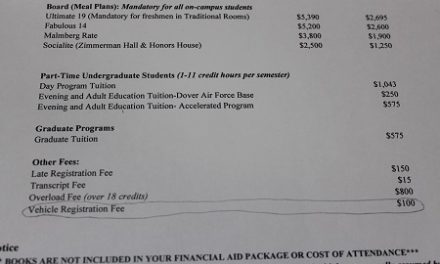By Kristen Griffith (Whetstone staff writer)
If you text, listen to music, watch TV – are constantly on your phone from the time you wake up until the time you go to bed – you may have some self-control problems.
At least that’s one conclusion that three Wesley College professors suggested to more than a dozen students at a presentation Oct. 7 about a study of student media-use they had conducted.
“We are not going to tell you cell phones are bad,†psychology professor Angela D’Antonio said.
But too much of them is not good, either.
She and fellow psychology professor Jack Barnhardt and media arts professor Victor Greto shared a study they have presented at several conferences.
The group had done a survey – given to 210 undergraduate Wesley College students – that measured their media use with their emotional intelligence (the ability to understand emotions), ego resiliency (adapting well to situations), and ego control (self-control).
They found a strong correlation with media use and ego control.
Other correlations for those who used a lot of media: an inability to manage emotions, low GPAs, lower SATs, lower social involvement, more stress and depression.
Junior Chelsea Marriner found this eye-opening.
She spoke about when her friend became closer to his phone, his behavior changed. He became more impatient and less talkative.
Barnhardt said the correlation between media use and ego control was much stronger for women than men.
“We are not saying women have a problem with self-control and media, but women have stronger results,†D’Antonio said.
Greto interviewed two dozen people who took the survey. They showed high levels of anxiety, impatience, need for gratification, and dependence on technology.
He said students told him, among other things, “My life is my phone,†and some reported they would have devoted more time to reading or drawing if they did not have a phone. Some even told him they wished they didn’t have a phone.
Greto said at a conference he witnessed a grown man trying to use the urinal and his phone at the same time.
“It is definitely not generational,†Barnhardt said.
The seminar turned into an open discussion so students could give their opinion.
Some students said it is unnecessary to be that connected to a phone. They shared experiences when they were forced to not have their phones and found it relaxing.
Students thought part of the reason people are attached to their phones is because of social media.
Sophomore Natasha Hurditt does not think social media is important.
“Before there was social media, we were always outside playing,†she said. “Now there are a lot of couch potatoes.â€
Students said social media is addicting because it gives people attention they may not get in person.
Barnhardt said receiving a notification can be thrilling or rewarding.
Other students said using social media and texting make it easier to express themselves. If someone is expressing his or her feelings to another, that person does not have to face the reaction in person.
D’Antonio challenged everyone to think about how technology affects them, and to reduce time spent on phones.



